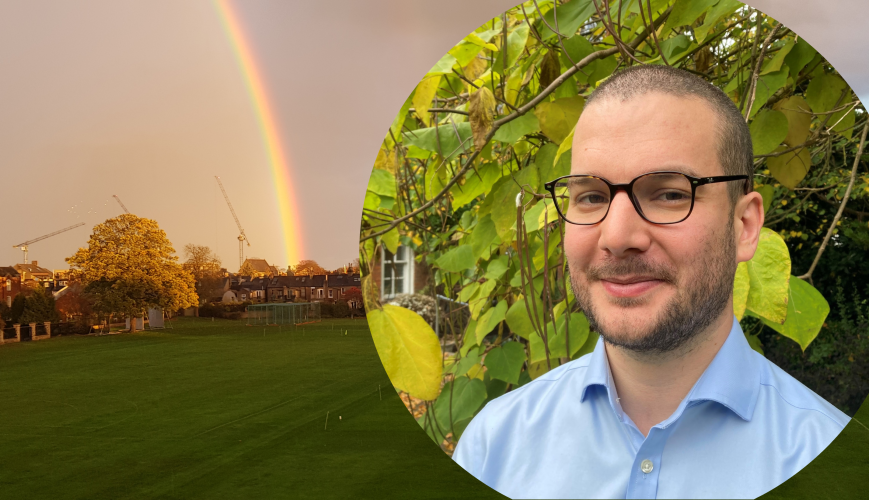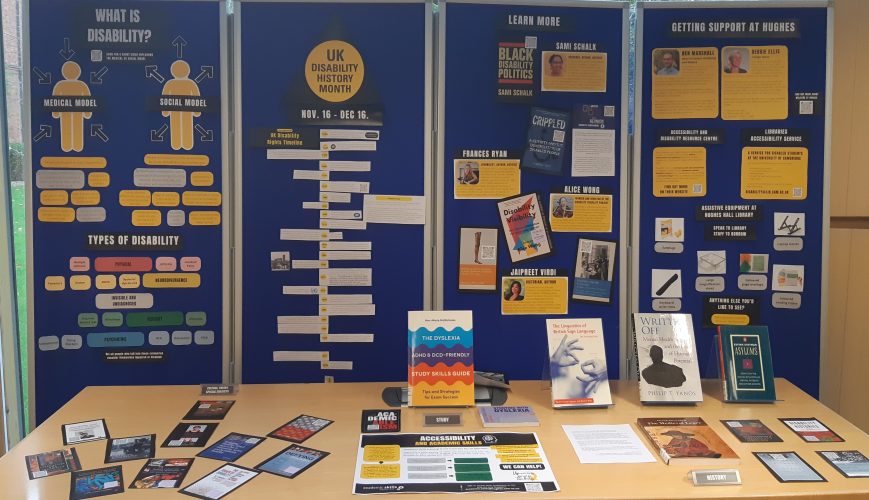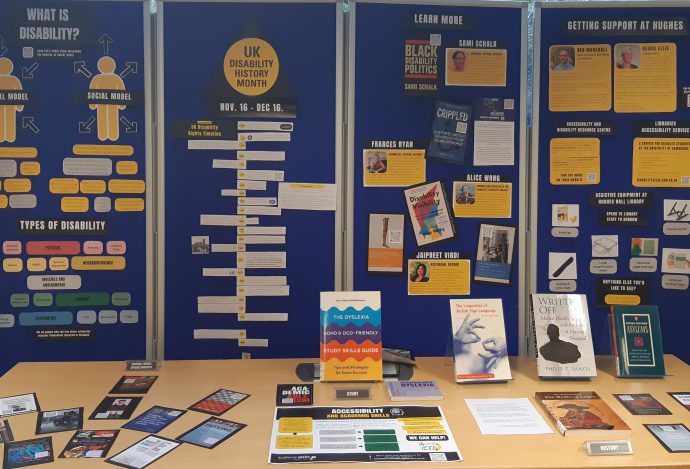What does accessibility mean at a Cambridge College
November 16 marked the start of ‘Disability History Month’ which runs until 16 December; the 2022 theme is disability, health and wellbeing – with further details available at https://ukdhm.org. At Hughes Hall, we talk about being inclusive and prioritising accessibility in its widest sense but what does that mean for the College, its departments and its people. Being accessible means more than access guides and ramps; here we look at the steps we are taking to meet the needs of disabled people and to raise awareness of some of the issues involved.
For students
Ben Marshall is our Head of Wellbeing and Welfare and leads on disability liaison for our College, and primarily our students. In practice this means working in a variety of areas to ensure Hughes is an accessible, inclusive and supportive environment for all to study and thrive in, alongside colleagues in the central university’s Accessibility and Disability Resource Centre (ADRC).

In practice, disability liaison means working with colleagues in the wellbeing, facilities, education and porter team, as well the central university, to ensure Hughes is an inclusive and supportive environment for all to study and thrive in.
For applicants
If you are thinking of applying to Hughes Hall and would like to discuss your needs, you are encouraged to get in touch with Ben or contact the Senior Tutor, Dr Tori McKee, to talk through your specific requirements and concerns. Arrangements for disabled students, including those with Specific Learning Difficulties (SpLD), are on an individual basis, in conjunction with the University Accessibility and Disability Resource Centre (ADRC): www.disability.admin.cam.ac.uk. Prospective students should contact the ADRC as early as possible and read the information for disabled students on applying to Cambridge. Once you have confirmed that you will be studying with us, the ADRC’s student information form and College’s disability information form, helps us work together with you in arranging appropriate support.
Accessible by design
This disability history month, Ben updates our community and highlights some of the steps taken to better support people who experience disability-related barriers in our community:
“Supporting our students is a real joint effort and we have been working closely with the facilities team and an expert-by-experience in physical disabilities to improve the accessibility of our site. You may have seen us gathered around doors in college, frowning and discussing the best way to create easy accessibility for future students! We’ll shortly be implementing modernisations like automatic opening mechanisms on several entrances across the College site and supplementing this with ramp access and replacement of old gravel pathways with flatter, solid resin surfaces in key places to facilitate access.”
Support Mechanisms
“Not all disabilities are visible of course and the education team have been working hard to ensure that people’s declared conditions, including long-term mental health conditions and specific learning differences, are accommodated appropriately in exam and other learning arrangements. Similarly, the ADRC have been busy drawing up individual Student Support Documents so that courses can take reasonable steps to ensure they are inclusive. Please do get in touch with Deb Taylor at ADRC, our assigned point of contact, if you think you may have needs that aren’t currently accounted for.” said Ben.
Library
Meanwhile, our Library has been recognised by the University for their excellent work marking key dates for celebrating and raising awareness of inclusion and equality initiatives and events, including for disability history month.

Discover the history of disability in the UK, and work by writers exploring these topics today. We are also debuting our new collection of assistive equipment for use in the Library, including laptop stands, wrist rests, coloured overlays and more.
Jess Hollerton, Library Assistant, told us: “The library display this month explores the history, theory, and activism in the struggle for disabled people’s civil rights, and covers the what, where and how of getting support as a disabled student at Hughes Hall. The display also features a (non-comprehensive!) timeline of disability history in the UK, and profiles highlighting the work of writers exploring these topics today – from the history of prostheses to representations of disability in Black women’s speculative fiction. We are also debuting our collection of assistive equipment which is now available to borrow on request from the Library Office. We have laptop stands, wrist rests, coloured overlays and more for students to use while studying in the Library.”
The basics
Hughes Hall works with AccessAble to provide comprehensive access guides to our site; for everyone in our community and for every visitor to our buildings and grounds. These detailed guides provide accurate information related to all aspects of access, from the approach to College, route planning and journeys around our grounds to the accessibility of individual rooms, virtual access guides and facilities. Visitors who would like to find out more about arrangements for people with disabilities, including those with specific learning difficulties, can find out more in the Access section of our website, and students and potential applicants who want to know more can also check the student Disability page for useful links.
Please see the AccessAble Access Guide to Hughes Hall for the detailed access guide.
Engage
The ADRC are always on the lookout for postgraduate students who would like to mentor students declaring disabilities. They are keen to hear from people who may have lived experience of navigating disabilities themselves, prior professional experience of helping others and/or simply veteran students with knowledge and experience to share. Do contact if this sounds like something you could contribute to.
Ben signs off with an easy reminder for us all:
“I’ll finish with a quick and easy guide for supporting others in our community regardless of their specific abilities, this month and beyond:
Be kind.
Don’t assume.
Engage respectfully.”
Ben is happy to hear from anyone with any questions or concerns about accessibility, inclusion or disability at Hughes, including your ideas for ways we could do things better: email bjm71@hughes.cam.ac.uk.
06.12.22





